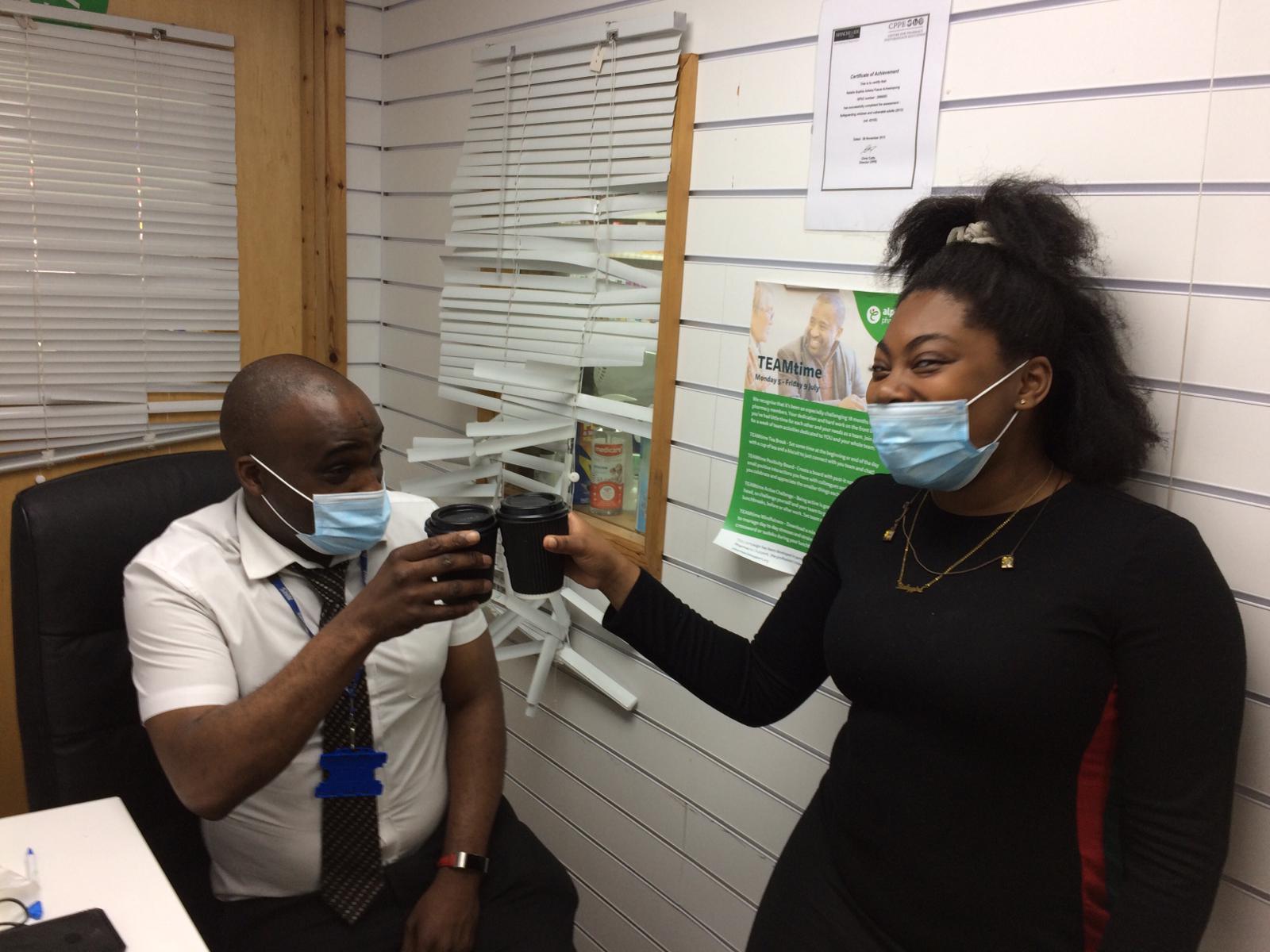
Staying connected with others
Take a look at the science behind maintaining and cultivating social connections, and tips on how to do so.

This page includes guidance and support on how to build positive relationships in the workplace, with a short self-study module to help you cement learnings.
There are many important characteristics that make up good, healthy working relationships. These include:
The paragraphs below detail how you can incorporate each characteristic in your working life. We’ll also look at how mindfulness can support your professional relationships, and what to do when things go wrong. And finally, you’ll also find a short self-study module looking at practical ways to build positive workplace relationships.
Jump straight to the self-study module
Mutual respect
According to Advisory, Conciliation and Arbitration Service (ACAS), dignity and respect top employees’ workplace wish-list. Few people thrive in a bullying, aggressive work atmosphere where they are rarely praised and regularly criticised. Respect for colleagues is an essential part of a good relationship. Whilst we always feel more comfortable in the presence of like-minded people, the realities of the workplace mean that we will often come into contact with people from a far more diverse range of backgrounds than we would in our private life.
The simplest, most effective way of showing respect is to encourage the input and suggestions of colleagues. All members of a pharmacy team are important and all of their views are equally valid. It is important to listen to the views of others and to be prepared to examine viewpoints that may differ from your own. Life would be very dull if we were all the same, therefore learn to accept and celebrate differences and try to maintain a professional and courteous manner at all times.
Here are some suggestions for demonstrating respect:
The flow of information between people is a very important part of the workplace. Open communication allows people to express ideas freely without fear of criticism. Do not be afraid of constructive criticism, listen and learn from it to become a better pharmacist and work colleague. Developing good communication skills is particularly advantageous as it also helps pharmacists to deal more effectively with patients.
It is important to bear in mind that communication is about more than just exchanging information. It is also about understanding the emotion and intentions behind the information. Good communication skills help people to connect with others effectively, build trust and respect, and feel heard and understood.
Empathy is, at its simplest, an awareness of the feelings and emotions of others. Empathy should not be confused with sympathy, which is the ability to feel ‘for’ somebody, rather it is the state of mind that allows people to feel ‘with’ another person. The ability to empathise is for some people intuitive, however others may need to work on their ability to empathise.
This is a vital skill that all pharmacists should try to develop, not just when dealing with members of their pharmacy team, but also with patients. Compassion, selflessness and being non-judgemental are key factors to developing empathy.
For further information on empathy, see the Skills You Need (an organisation which provide resources for improving professional and personal life) website.
All good relationships are built on trust. Trust is built up by keeping up with work commitments, doing all work to the highest standard and resisting the temptation to gossip. People who can demonstrate that they can get the job done will gain trust from both patients and colleagues.
Interpersonal skills in the workplace are generally related to an employee’s ability to get along with others while getting the job done. Interpersonal skills include everything from communication and listening skills to attitude and deportment. Time spent developing these skills will serve pharmacists well throughout their working life. These include:-
Verbal and non-verbal communication
Communication is more than just an exchange of information. Clarity of speech, remaining calm and focused, being polite and following some basic rules of etiquette will all aid the process of communication. However, it is not just what you say, but also how you say it. People will also take into account factors such as eye contact, body posture and body movement. Be prepared to adjust your verbal and non-verbal communication to fit the situation, for example, pharmacists may adopt a different style when talking to a patient as opposed to a work colleague.
Listening skills
Another important aspect of effective communication is listening skills. Poor listening skills mean that messages can be misunderstood or misinterpreted and this can prove frustrating. Our ability to listen effectively depends on the degree to which we perceive and understand both verbal and non-verbal messages. A good listener will not only listen to what is being said, but also note what is left unsaid or only partially said.
Negotiation
Effective negotiation helps to resolve situations where what one person wants may conflict with what another colleague wants. Ideally, it is best to find a solution that is acceptable to all parties. Identifying common goals and being willing to compromise will normally result in an effective solution.
Problem-solving and decision-making
No job comes without problems. Ignoring problems in the hope that they might go away is not a solution. The best way to deal with problems is to view them as challenges and then consider how best to overcome them. Where challenges have a number of possible solutions, good decision making skills are required. Where possible, listen to the opinion of others before making a decision and reflect on the impact any decision will have on others, for example, patients and work colleagues.
Assertiveness
Not everybody is naturally assertive, and often people are not confident enough to assert themselves in the workplace. Being assertive means expressing yourself effectively and standing up for your (or another’s) point of view, without being aggressive or inconsiderate to others. As a responsible pharmacist it is important to become accustomed to taking the lead and have the confidence to instruct team members about good working practices. Pharmacist Support offers training on Building Assertiveness on our Wellbeing Learning Platform. The platform is free for pharmacists, trainees and students to use and hosts a range of wellbeing training videos.
Find our more about the platform and take the Building Assertiveness course
The Centre for Pharmacy Postgraduate Education (CPPE) also offers a guide on assertiveness. Working through this programme should help pharmacists to see personal benefits such as increased confidence, self-esteem and self-motivation. For further information, see the CPPE website.
We don’t have to be best friends with everyone in the workplace. However, having good rapport with all our colleagues can hugely impact our happiness at work and the dynamic between the team. The guidance on this page can help you to build such rapport and support a positive workplace culture.
Mindfulness is a technique that can help people to build good relationships. Mindfulness is a practice that allows us to pay attention to, and see clearly what is happening in our lives. People who practice mindfulness are aware of their feelings and the impact they have on themselves and others.
Mindfulness can help to reduce stress and anxiety and conflict and increase resilience and emotional intelligence, while improving communication in the workplace. It can be helpful to consider the following questions to assess your own mindfulness in the workplace. Are you:
If the answer to some or all of the above is yes, it is likely that you are spending at least some of your time at work on automatic pilot. For further information about mindfulness and how to incorporate it into your life, see our Mindfulness page.
Naturally, there are times when professional relationships do not develop in an appropriate manner. It is important to recognise and remedy these situations as soon as possible before the behaviour towards you becomes entrenched.
If things escalate to bullying or harassment, it’s time to take immediate action. You’ll find support and guidance on how to deal with unwanted behaviour on our Bullying and Harassment page.
Go to the Bullying and Harassment page
Work through the short module to explore the different elements of building positive workplace relationships, and practical ways to implement them in the pharmacy.

Take a look at the science behind maintaining and cultivating social connections, and tips on how to do so.

On this page, we look at some common challenges your colleagues may face, and ways you can support them through these difficulties.

Paul Scott-Harris shares his advice for supporting LGBTQ+ colleagues and experience of looking for work outside of the UK.